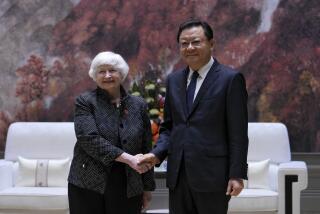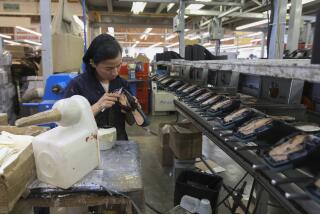China criticizes Senate bill aimed at undervalued currencies
China blasted a proposed U.S. bill that would punish countries for undervaluing their currency, saying it would undermine the global economy and potentially lead to a trade war.
China’s central bank and ministries of commerce and foreign affairs released separate statements Tuesday criticizing the U.S. Senate measure that would slap tariffs on Chinese imports.
The bill, adopted Monday with rare bipartisan support, was designed as a way to protect U.S. jobs. It’s future in the Republican-controlled House was less certain.
The legislation “seriously violates rules of the World Trade Organization and obstructs China-U.S. trade ties,” said Foreign Ministry spokesman Ma Zhaoxu in a statement posted on the Chinese government’s official website.
China’s central bank said the attention given to China’s currency, known as the yuan or renminbi, distracts Washington from the real issues plaguing the American economy.
“The yuan bill passed by the U.S. Senate will not solve its problems, such as insufficient savings, high trade deficit and high unemployment rate, but it may seriously affect the whole progress of China’s reform of its yuan exchange rate regime and may also lead to a trade war, which we would not like to see,” the bank said on its website, according to a translation by Reuters.
The yuan’s value is set daily by China’s central bank, not by free markets. Critics contend the yuan is undervalued by as much as 40% to give the world’s second-largest economy an unfair trade advantage.
U.S. labor advocacy groups, such as the Economic Policy Institute, said this has fueled a trade deficit with China that cost Americans 2.8 million jobs from 2001 to 2010.
Debate still rages over whether targeting China’s currency will return jobs to the U.S., as manufacturing could shift to another low-wage country, such as Vietnam.
The yuan has edged up about 10% against the dollar since it was unpegged from the greenback in June 2010. Experts said the central bank was in favor of faster appreciation to combat inflation, which is running at a three-year high. A stronger yuan would make China’s imports cheaper and its exports more expensive.
But the Ministry of Commerce, which oversees trade, and officials in coastal manufacturing provinces are against more aggressive appreciation for fear it will bankrupt factories, sap taxes and leave millions out of work.







